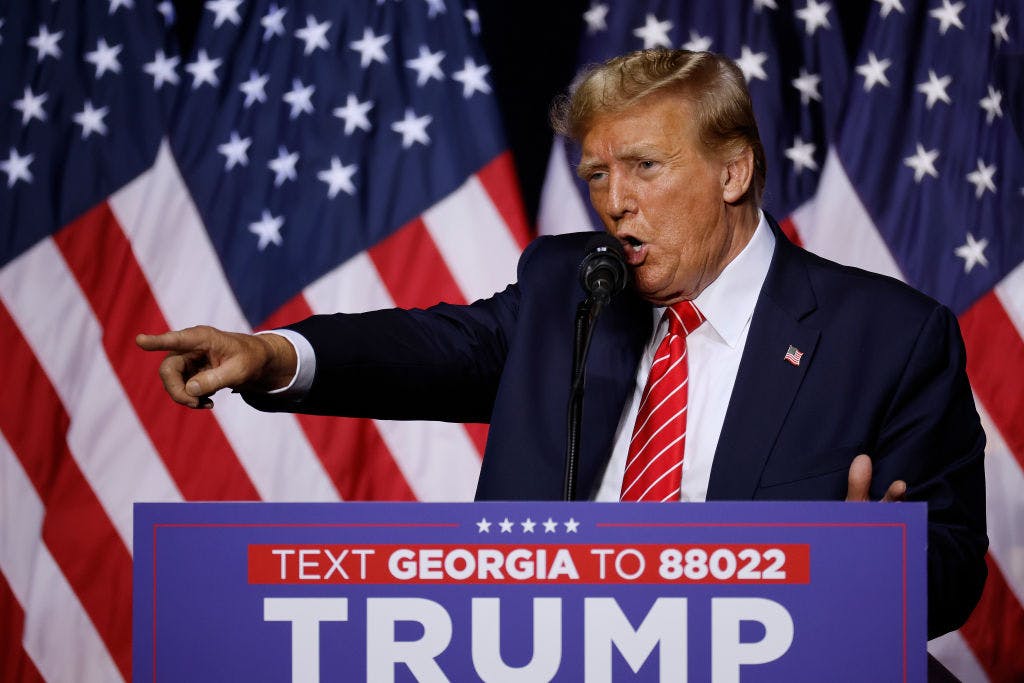Trump, Accusing Jack Smith of ‘Blackmail and Extortion,’ Makes His Immunity Case to the Supreme Court
Allowing the special counsel’s case to proceed would inflict on future commanders in chief ‘years of post-office trauma,’ the 45th president asserts.

President Trump’s brief to the Supreme Court, arguing that the president “cannot function, and the Presidency itself cannot retain its vital independence, if the President faces criminal prosecution for official acts once he leaves office,” is his most fulsome statement yet on the powers of the office he once held.
The 67-page filing lays out the 45th president’s position on immunity in advance of oral arguments at the high court. It declares that a “denial of criminal immunity would incapacitate every future President with de facto blackmail and extortion while in office, and condemn him to years of post-office trauma at the hands of political opponents.”
Special Counsel Jack Smith’s January 6 case against Mr. Trump is frozen pending a ruling from the Nine as to whether the former president is entitled to immunity from prosecution. A district court judge, Tanya Chutkan, as well as the United States Circuit Court for the District of Columbia Circuit, have both held that he is not so protected in perpetuity.
Mr. Trump, though, warns that the “threat of future prosecution and imprisonment would become a political cudgel to influence the most sensitive and controversial Presidential decisions, taking away the strength, authority, and decisiveness of the Presidency.” It is for that reason that the Department of Justice policy is not to prosecute a sitting president.
The Constitution mandates that “The executive Power shall be vested in a President of the United States of America.” He is ordered — the word is “shall” — to “take Care that the Laws be faithfully executed.” That responsibility is what drove the high court, in Nixon v. Fitzgerald, to rule that the president is immune from prosecution for civil suits for any actions within the “outer perimeter” of his official duties.
Mr. Trump reaches back to Marbury v. Madison, from 1803, for the proposition that the president “can never be examinable by the courts,” and contends that Mr. Smith’s position — that immunity is not absolute, and ended when President Biden took the oath of office — is one of the “greatest threats to the President’s separate power, a bedrock of our Republic, in our Nation’s history.”
Although the Supreme Court requested briefing only as to whether a former president enjoys immunity from criminal prosecution for “conduct alleged to involve official acts during his tenure in office,” Mr. Trump renews his contention that the answer to that question is linked to the Impeachment Judgement Clause, which ordains that the “Party convicted shall nevertheless be liable and subject to Indictment, Trial, Judgment and Punishment, according to Law.”
Mr. Trump, though, was acquitted by the Senate, and argues that the verdict means that he cannot be criminally prosecuted for the same underlying actions. He calls this requirement a “formidable structural check against politically motivated prosecutions by requiring a majority of the House and a supermajority of the Senate to authorize such a dramatic action” as the charging of a president.
Warning that the charging of a president would present the “ultimate inter-branch conflict,” Mr. Trump observes that “from 1789 to 2023, no former, or current, President faced criminal charges for his official acts — for good reason.” He maintains, and cites Alexander Hamilton for support, that “impeachment, not prosecution in Article III courts, provides the constitutional check against Presidential misfeasance.”
The D.C. Circuit, though, ruled that “for the purpose of this criminal case, former President Trump has become citizen Trump, with all of the defenses of any other criminal defendant. But any executive immunity that may have protected him while he served as president no longer protects him against this prosecution.”
The stakes could not be higher for Messrs. Trump and Smith. If the justices side with the former president with respect to the Impeachment Judgment Clause or the immunity issue, the case is likely over. If, though, they uphold the D.C. Circuit, a trial before Judge Chutkan this summer appears likely to proceed.

